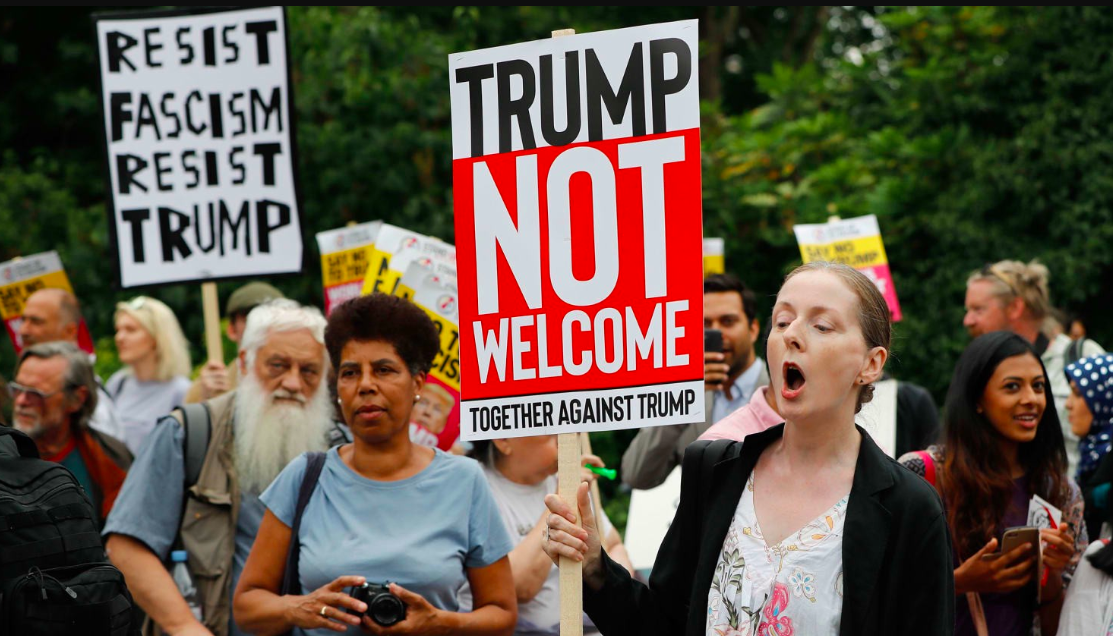You’re sitting on the bus, minding your own business and untangling your headphones when you hear it: the person in front of you telling their friend how irritating Americans are with their ugly accents and boisterous personalities. Then you clock the rather vocal group of American semester-abroads a few rows ahead and assess the situation. Your phone rings and you choose not to answer it because the two people in front of you might hear your accent, and you might be exposed to everyone on the 46a as an American.
Being an American abroad has always been a precarious position riddled with unfavourable connotations, stereotypes and general distaste. Americans are by nature, loud. This is something that I only realised upon arriving in Europe and observing other groups of Americans speaking amongst each other at a significantly louder volume than everyone else. Americans are confrontational. They speak up when they feel they have suffered an injustice – whether it’s someone skipping the queue in front of them or the deli staff getting their sandwich order wrong. This no bullshit attitude can either work to your advantage or it can quickly betray you into sounding like the biggest asshole in the room.
The real kicker for me has always been that America, as a teenager, never felt like home to me. I moved to England from California when I was eighteen. When I decided that college in London was too big for me, I moved to Dublin where I attended UCD for the remainder of my undergraduate studies. At UCD, I knew no other Americans in a single honours course and I quickly adjusted to the fact that every time I raised my hand in class, the whole room would turn around to stare at me the second the words left my American mouth. I disassociated myself from American exchange students, for the most part. I wanted to blend and fit in. Currently I am attending Trinity for a Masters in Creative Writing. At Trinity I have found myself in a unique situation: the majority of the class is American.
While I have always been hyper-aware of my existence as an American here, or really anywhere that isn’t America, I will never forget the day that President Donald Trump was elected into office. I hung my head so low with shame that it could have brushed the floor. My boyfriend took me to the IMMA after I had spent all morning grieving and disavowing my own country. I refused to speak to him on the bus. When he asked me what was wrong I whispered to him with tears in my eyes that I couldn’t have anyone know I was American. I just wanted to appear Irish at that time. I didn’t want to sound like me. I was in mourning.
Growing up, I always got this overwhelming sense that Americans were rather unpopular abroad, despite half of our country insisting with delusion that we are the greatest nation on the planet. And who could blame the world for hating our guts? America has inflicted a lot of pain on a lot of people, including its own. America has historically been filled with a lot of hate, bigotry, and unnecessary violence. This is a collective trauma that Americans will likely carry for as long as our country exists, or at least until radical change is implemented.
But when Donald Trump was elected I was suddenly held personally accountable for my country electing a racist monster.
All of a sudden getting through customs became an ordeal, and an experience that has on more than one occasion reduced me to tears after facing appalling treatment by a border patrol officer. I have lived in Ireland for four years and yet in the years since Trump’s election I have been grilled at the Irish border like a criminal every time I return from a trip to the States. Thanks to Trump, the Anti-American sentiment abroad has been amplified tenfold. Thanks to him, it has become less appealing than ever for me to open my mouth in public.
I’ve dulled down my own accent to blend in more and draw less attention to myself in public but I’m tired of people talking down to me, speaking to me like I’m an idiot just because of my accent.
And while this is in many ways a reflection of an expat’s experience abroad, it is also a critical observation of what exactly it means to be an American in this day and age. That in a rather revolutionary time such as this, full of turmoil and a desire for social change, being an American, even an American-expat, is often synonymous with Donald Trump. With gun violence. With racism, sexism – the list goes on. And no matter how far I run from the things that are happening at home, they are of course with me, always.
That is the burden I must carry as an American. And although I have found a community here, have met remarkable people who make this place feel like home, and recognise that I am an incredibly privileged and lucky young woman, I still find it difficult to imagine a time when I will not feel the need to apologise for being American. When I will not feel ashamed to be from a country that keeps getting it so wrong.






